There’s no question the American criminal justice system is in terrible shape, and the problems plaguing it are exacerbated as time goes by. In 2014, the US still imprisons more people than any other country, incarcerating black men at disproportionately high rates. Police killings in Ferguson and New York and incidents of police brutality dominated the news this year, and demonstrated that law enforcement is in need of overarching reform.
But 2014 also saw a number of important, beneficial changes to the US the criminal justice system. Here are some standouts:
Solitary confinement reform
Up to 80,000 prisoners are held in some form of solitary confinement in the US. The practice has been described as torture and condemned by the United Nations as causing long-lasting harm to inmates’ mental health. In 2014, 10 states introduced measures to reduce the numbers of inmates—including the mentally ill—they hold in solitary confinement.
Reducing sentences
US courts are notorious for handing out long sentences for low-level offenses, contributing to overcrowding prisons. The federal government took several important steps in 2014 to change the situation. In August, attorney general Eric Holder announced that the Justice Department would abandon pursuing mandatory minimum sentences for low-level drug offenders. In November, a set of sentencing recommendations from the US Sentencing Commission went into effect, allowing thousands of inmates to petition to reduce their sentences.
Decriminalizing marijuana
Unquestionably, 2014 was a big year for pot. Alaska, Oregon and Washington DC voted to legalize marijuana for recreational use. A number of other states will hold ballot initiatives in 2015. According to human rights organizations those arrested for marijuana possession are disproportionately people of color, making it a civil rights issue.
An unlikely coalition
Criminal justice reform is one of the few areas where liberals and conservatives agree. After several botched executions through lethal injection, there were calls from conservative pundits to abolish the death penalty. In California, proposition 47 to reclassify certain crimes as misdemeanors saw support from representatives from both ends of the political spectrum. The latest backer of criminal justice reform is Tea-Party donor billionaire Charles Koch.
A discussion about race and policing enters the mainstream
Police killings of unarmed black men in Ferguson, New York, and other places brought the issue of police brutality into a national spotlight and under widespread scrutiny, changing public perceptions about the treatment of people of color by law enforcement. President Obama and Holder launched initiatives to increase monitoring of police officers and to engender trust between the police and local communities.
A push to change rape culture on US campuses gains national momentum
It was a blockbuster year for the movement to eradicate sexual assault on campus. Several high-profile cases helped launched a national discussion, and a push from activists resulted in a skyrocketing number of federal investigations—from 55 in May to 90 in December—into how schools deal with sexual assault cases.
